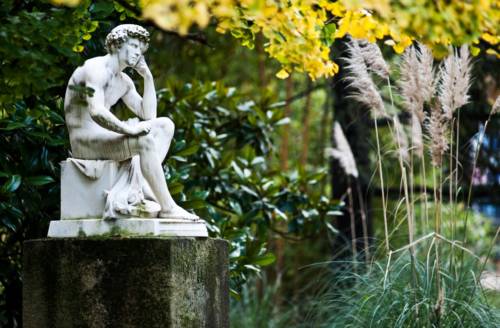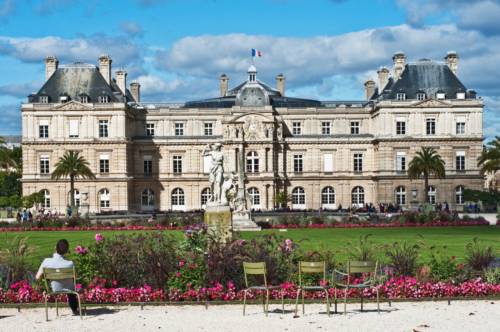
A Native Parisian on The Majesty of The Luxembourg Garden, Then and Now
As a born and raised Parisian, I have often been surprised to hear my friends from the country tell me how hard it was for them to imagine a childhood in Paris. And furthermore, although most certainly culturally enriching, how cold and soulless it must’ve been. At this point in the conversation, most often, they pop THE question: “But what does being a real Parisian mean to you?”. I think it all comes down to those places where you have made so many memories, it is hard to pick just a few. Places that make you feel right at home, even when you’ve been a stranger for a while.
To me, one place sums it all up: the Jardin du Luxembourg. I grew up right next to it, and my relationship to it has never ceased to evolve. The garden and I go way back– so much so that it sometimes feels like an actual character in my memories. Perhaps because it was the first place my mother took me to, in my Silver Cross baby carriage, right after I was born. At that time, she would mostly wander around the south-west part of the garden. Not only was it the closest to home, but also the calmest. She would walk the silent and peaceful aisles, between the espaliered apples and pears, so perfectly trimmed they seamed ageless, and the centenary chestnuts, until she had found the perfect spot to sit a while.
As I learned to walk, there was no place I loved more than the three great lawns, huge rectangles framed by more chestnut trees, enhancing the great perspective between the Marco Polo square and the magnificent Sénat palace. It was the perfect spot for somersaults, and falling over and over again. The fiercer on my legs I got, the deeper into the garden’s ground I’d venture. I remember being fascinated by ducks and ducklings, the way they would float in the great central basin, where I’d actually end up falling while trying to catch one… A few years later, I would get angry at the elements for not helping me get my miniature sailing boat across that same basin, not understanding yet that I was the one to blame for my own lack of concentration.
“The garden and I go way back– so much so that it sometimes feels like an actual character in my memories.”
Of course, my school was on the other side of the park from my home. So not only was I crossing it twice a day, but around 7th grade, I was also learning the garden’s history. The 25-hectare domain was entirely bought by Marie de Medici, then young Queen of France, to the Duke of Luxembourg– a history intimately linked to the French revolutions. We owe its present shape and layout to no other than the man who transformed Paris, the Baron Haussmann. One must imagine the palace was located at this time between the already-fancy Faubourg Saint-Germain and the country, yet the gardens of this royal home have been opened to Parisians since the middle of the 17th century.
From the immobile, chalky white statues along the balustrade, I would learn about Blanche de Castille, Anne de Bretagne, Marie de Médicis and their great destinies. I would enjoy endless turns on the old carousel, until my head felt dizzy, and long before I understood Rainer Maria Rilke’s poetry. On rainy days, we would all enjoy the puppet show where The Three Little Pigs, Little Red Riding Hood, and, most of all, Guignol (the typically French character of a stupid policeman) came alive for our eyes only, in the exact same way they did for our parents, and even their own parents, before us. How many times have I gotten back home with my hands and knees hurting from the gravel, injuries earned the hard way from running too fast or riding my bike with abandon?
When autumn came, the gardeners would rake the brown chestnut’s fallen leaves into tidy heaps, each looking as high as mountains. We couldn’t help but jump in with both feet, rolling ourselves into the noisy leaves on every occasion we had– no matter how angry the gardeners got nor how long it took to clean ourselves up once back home. In the winter, the trees became meager and frightening without their beautiful leaves, the parterres colorless without flowers. Our gloves and hoods on, we would rush into the garden, using it only as a shortcut through the freezing city. By the beginning of spring, we were like lions in a cage, hoping every day to be finally allowed to play in the park again. The leaves and the worms (which I even remember eating as a challenge), the flowers and the birds (how many sparrows, fallen off a branch, have I taken back home in a desperate attempt to save them ?), and the bees and the butterflies were back. Like some kind of sandglass, we tirelessly counted the cycles left until the end of our blessed childhoods.
Of course, striking memories in the garden were still to be made: the first get-together with friends (ok, with boys) on sunny afternoons, the hours spent reading Victor Hugo’s Misérables on the exact bench here Marius and Cosette had meet for the first time; incredible music, from the free concerts at the kiosk to outdoor opera super-productions. Or the very simple pride of seeing my father running, day after day, around the garden, prepping for the Paris marathon. But none of those memories would ever be tainted with that same natural innocence anymore. Like most of my childhood friends, I changed neighborhoods quite a while ago, and only then did the “Luco”, as we call it, take on that Proustian importance to me. But, even today, every time I can, I walk through the garden again. Every path, every single nook and all those memories come back to me, making that dear “Luco” once again the center of my Paris.
Fifteen minutes before the garden would close, the sound of the guards’ whistles reverberated through the empty park. I was always scared that I would not get out before the high black and gold grids would close, and would find myself locked in for the night. For a few minutes, I’d imagine the garden’s secret life, bathed in the moon’s cold and gentle light. The majestic Nubian bronze lion, standing victorious over it’s prey– an ostrich– already so impressive by daylight, would come to life. I wondered what would happen if I found myself nose to nose with it. Would it eat me alive, or would I find shelter for the night against his warm fur and protecting paws? I’d see the Bacchus happily dancing to the sound of the Faun’s flute, and George Sand bathing in the Medici Fountain, and I thought to myself that it all had to be way more interesting in the intimacy of the night. This waking dream would stop only as soon as I had passed the severe-looking guards and regained my stroll down the far too real Boulevard Saint-Michel.




































